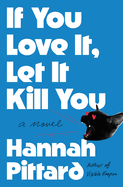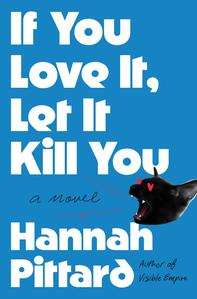
 Hannah Pittard's sixth book, If You Love It, Let It Kill You, is a quirky work of autofiction about an author and professor tested by her ex-husband's success, her codependent family, and an encounter with a talking cat.
Hannah Pittard's sixth book, If You Love It, Let It Kill You, is a quirky work of autofiction about an author and professor tested by her ex-husband's success, her codependent family, and an encounter with a talking cat.
Hana P. goes into a tailspin when she hears that her ex-husband's debut novel chronicles his marriage-ending affair with her dear friend. "I don't like your portrayal," another friend warns her. "Smug... Insecure." (That Hana wrote a whole memoir about said acrimonious divorce--i.e., Pittard's We Are Too Many--doesn't lessen the offense.) Researching her ex's career, Hana learns that he also published a short story in which she's "knifed to death by a homeless man." The news prompts her frenetic inquiry into the ownership of stories and life's possible routes.
Although Pittard (Visible Empire; Listen to Me) opens by declaring, "What follows is pure fantasy," her protagonist has a clear autobiographical heritage. Hana lives in Kentucky, with her divorced parents and sister nearby. They often meet for drinks and banter on Hana's porch. She has a comfortable partnership with boyfriend Bruce, and a good relationship with his daughter, "the eleven-year-old." However, she's been texting with "the Irishman" and is tempted to resume their affair. Meanwhile, she's fending off the flirtatious attentions of a 20-something student.
Hana (or should that be Pittard?) relishes flouting the "rules" of creative writing here. For her Hemingway-hating undergraduates--whose names she can't keep straight--it's all "vampires or talking kittens," she complains. Yet one thread involves Hana finding an injured cat and engaging it in personal, philosophical dialogues before handing it off to a student. In the theoretical section "A brief interview," her students mutiny. "What about the cat?" they ask; "you're fixated and then...? What? Is there a plot here or...?"
It's a fair question. And yet a sort of plot does develop, as crises both literal and existential teach Hana who and what matters. With her affectations (such as playing dead) and unreliability, Hana can be a frustrating narrator, but the metafictional angle renders her more wily than precious. The dialogue and scenes sparkle, and there are delightful characters, including Hana's father, who's had five wives and starts microdosing psilocybin at age 80. Pluck any line and it's sure to be memorable ("I know my mother like the inside of my elbow"). This gleefully odd book is perfect for Miranda July and Patricia Lockwood fans. --Rebecca Foster, freelance reviewer, proofreader, and blogger at Bookish Beck
Shelf Talker: Hannah Pittard's zany work of autofiction questions the rules of creative writing--as well as the logic of life and love.

